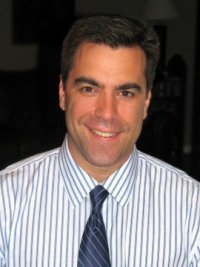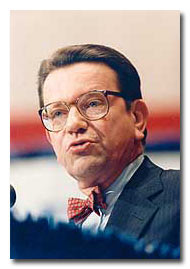 I didn’t expect at age 39 to already be writing about my political career in past tense.
I didn’t expect at age 39 to already be writing about my political career in past tense.
I grew up with a love of politics, and tended to worship political heroes over, say, sports or movie stars. My earliest political memory is of Jimmy Carter’s 1980 defeat to Ronald Reagan. I didn’t understand how such a good, decent and honest man could possibly lose, and wrote him a letter conveying my anguish. The President and Mrs. Carter responded with a nice letter and a booklet about his presidency.
My first volunteer experience came with Adlai Stevenson III’s run for Governor in 1982. The Stevenson’s were from my hometown of Bloomington, IL—the same town where Abe Lincoln often practiced law just down the road from his hometown of Springfield. His father was so honest that he didn’t intervene when the local paper, which his family owned, actually endorsed Eisenhower when he challenged him for president.
The 1982 Governor’s race was a nail biter, with Stevenson losing by the narrowest of margin . The contest was rife with accusations of vote fraud committed by his incumbent opponent. For the second time in two years, my man lost. I certainly experience a lot of political disappointment by age 11!
. The contest was rife with accusations of vote fraud committed by his incumbent opponent. For the second time in two years, my man lost. I certainly experience a lot of political disappointment by age 11!
My knight in shiny armor came in the likeness of a man who donned thick horned-rimmed glasses, big ears and a bowtie. Paul Simon was kind of a paradoxical figure, his nerdy likeness met by a commanding baritone voice; a leading thinker in the Senate who was also a college drop out. I read several books he authored, and probably attended a half dozen of his frequent town meetings conducted throughout the state. Senator Simon showed me that the “good guys” can prevail in the end. Moreover, he was a liberal Democrat who won a good deal of Republican votes, indicating to me that folks are capable of voting for someone they disagree with if they trust his integrity and motives.
I attended my hometown college, and became very active in causes. I was a student leader in the protest movement against the first Gulf war, and somehow became very interested in El Salvador. My junior year I studied Spanish in Guatemala, and became acquainted with a poet in residence at a neighboring university, Carolyn Forche, who championed “poetry of witness” that documented human rights abuses across the globe. As I neared graduation, Forche actually helped make arrangements for me to work in El Salvador. But her messenger somehow mishandled Forche’s correspondence with her “guerilla” contact, and I heard nothing until I was enrolled in graduate school in Ohio nearly a year later.
 After teaching for six years, I gradually transitioned into work in the non-profit sector, beginning as a program manager for a new Americorps program in Cincinnati. We trained inner-city youth to become community leaders, and placed them to work as apprentices at local non-profits. From there, I went on to direct a civic organization founded by former Ohio Governor Jack Gilligan. Gilligan remains an inspiration to this day. Few folks remember today that when Gilligan was elected Governor of Ohio in 1970, several pegged him as a man who would be president. I came to know him as a school board member—the man’s passion for education leading him to return to politics after several decades to run for Cincinnati school board in his late 70’s. Gilligan raised taxes (!) as Governor to better fund education. He didn’t play it safe and coast as a front runner towards the ’76 presidential election but, rather, lost re-election by the slimmest of margin (actually went to bed thinking he had prevailed).
After teaching for six years, I gradually transitioned into work in the non-profit sector, beginning as a program manager for a new Americorps program in Cincinnati. We trained inner-city youth to become community leaders, and placed them to work as apprentices at local non-profits. From there, I went on to direct a civic organization founded by former Ohio Governor Jack Gilligan. Gilligan remains an inspiration to this day. Few folks remember today that when Gilligan was elected Governor of Ohio in 1970, several pegged him as a man who would be president. I came to know him as a school board member—the man’s passion for education leading him to return to politics after several decades to run for Cincinnati school board in his late 70’s. Gilligan raised taxes (!) as Governor to better fund education. He didn’t play it safe and coast as a front runner towards the ’76 presidential election but, rather, lost re-election by the slimmest of margin (actually went to bed thinking he had prevailed).
The non-profit I directed, Citizens for Civic Renewal, had a primary mission of tapping the talents of private citizens to serve on task forces designed to attack our region’s most pressing problems. It served as my immersion into the policy world, and in a context that was non-partisan and solutions focused. I sometimes wish I remained locked in that universe, as opposed to the one I soon entered.
In 2002, post-911, a popular, now wartime president, George Bush (“W”), was presiding over a charged political climate fueled by anxiety about terrorism and post-WWII era Americans feeling vulnerable for the first time. The local (and still in office) congressman, Steve Chabot, a genuinely nice and honest man whose political views are very different from my own, was entering a re-election contest without opposition. Fueled by idealism, I offered my services to the Party and entered the race after the filing deadline, having to run as a write-in on the primary ballot in order to get placed on the general election ballot. (My first contribution to The Recovering Politician, the Father’s Day edition, re-lives that race a bit.)
I opposed the Iraq war as a tragic example of “mission creep,” arguing we were taking our eye off the ball against Al Qaeda. I made a strong case for energy independence as a national security imperative. I advanced proposals on education, the environment, entitlement reform. I was a policy wonk who took issues very seriously. But with little money, and a local media that really didn’t waste its time covering elections deemed uncompetitive, espousing my views amounted to little more than shouting in the wind. I was routed.
In 2004, I gave Congress another shot against the same opponent. The political environment had changed, support for war in Iraq had gone from like 90/10 to 50/50, and a newborn “netroots” movement was created out of Howard Dean’s inspired but brief presidential run—a movement I thought I could tap and that defied the orthodoxies of the Party establishment.
Iraq had gone from like 90/10 to 50/50, and a newborn “netroots” movement was created out of Howard Dean’s inspired but brief presidential run—a movement I thought I could tap and that defied the orthodoxies of the Party establishment.
Democrats were now coming out of the woodwork in conservative Southwest Ohio. But the fundraising still came hard. As I said in my first contribution to RP, ”when you are an underdog you often find yourself working like mad to win a race that no one thinks you can win, and often are met with ridicule by patronizing reporters and dismissive campaign donors that seem to take you less seriously for even trying.”
My campaign gained traction in the very end. Lou Dobbs ran a profile on his CNN show; Howard Dean named me to his “Dean Dozen” and made a campaign appearance on my behalf. We started to get some “buzz.” But it was too little, too late. I lost the election by a closer margin than the 2002 race, but it was still a 59-41 route. But the energy and idealism of that campaign, the charged environment of a presidential election year, and my genuine enjoyment of debates, speeches, and other candidate requirements was a far cry from the tentativeness I felt as a first time candidate in 2002. I found my voice, and transformed from a somewhat tentative introvert to a passionate stump speaker.
But I also took from that experience a real frustration about how the national party treats its challengers. Indeed, challengers take one for the team without knowing that the team captains regard you as being disposable. The life of a candidate in a race that isn’t targeted by the powers-that-be is pretty lonely. We are fueled by our idealism, but little else. I came out of the campaign with debts I am still paying to this day, and had no way of knowing the tremendous strains that it would put on my young family.
My political efforts, however, ultimately paid off when I was appointed to a vacant seat on Cincinnati City Council in February, 2009, nine months ahead of the election. Few incumbents on Council lose, and if I could hold the seat, it would likely remain mine for eight years.
 But then the “sh—t hit the fan.” The city—due to the late 2008 economic meltdown—saw its revenues plummet, and suddenly faced a massive debt. This was compounded by a pension crisis fueled by the stock market plunge. My honeymoon as Council’s newest member lasted all but a few weeks. With the police and fire budgets constituting 2/3 of the overall budget, it appeared layoffs were imminent. Yet the police and fire unions were also very powerful, and, as I would soon learn, didn’t take well to being asked to sacrifice.
But then the “sh—t hit the fan.” The city—due to the late 2008 economic meltdown—saw its revenues plummet, and suddenly faced a massive debt. This was compounded by a pension crisis fueled by the stock market plunge. My honeymoon as Council’s newest member lasted all but a few weeks. With the police and fire budgets constituting 2/3 of the overall budget, it appeared layoffs were imminent. Yet the police and fire unions were also very powerful, and, as I would soon learn, didn’t take well to being asked to sacrifice.
I actually wasn’t scared of the crisis. I made my living in public policy, and was accustomed to analyzing budgets and working to make government systems more efficient. To my displeasure, Council went on a summer recess instead of tackling the budget crisis, with a budget needing to be voted on in the fall. (What’s with recess? We weren’t school children, and it’s not like we were coming home from DC to engage our constituents.) I decided to use that time to study the budget.
I discovered in my analysis of the Fire Department, which had an $80 million budget, that over 80% of its activity had nothing to do with putting out fires. Indeed, the city had a policy of dispatching a fire engine with four firefighters and an ambulance with two paramedics to every single medical call. There was no system of triaging 911 calls, and little distinction when it came to rescue response between a bum passed out in an alley and a major fire.
My analysis of the police department revealed that despite its massive growth over the past few years (fellow councilmembers coasted to re-election by adding new cops, despite their not being requested by the chief), there was little accountability for the new dollars and a budget that approached $110 million. To my dismay, I learned that nearly 40% of police personnel didn’t get assigned to investigations or patrols, that there were 300 non-sworn personnel that served as support staff to the 1,100 member Cincinnati police department (one support staff for every three officers), and egregious spending on overtime—abuses that the local paper finally hit hard . . . a month after the election (sigh). I also learned that if the police officers just gave up their raises for the first time in five years it would offset the cuts the city manager had asked them to make, and eliminate the need for any police layoffs.
I also studied the pension, and came around to supporting reforms that seemed modest in their requirement of asking pensioners to have their retiree health insurance paid 90% versus 100% by the city.
I came out of the summer recess empowered with solutions, and relieved that the budget could be resolved without cuts to basic services that had already endured 30% cuts over the past decade. We could ride out this crisis by changing dispatch policy for the fire department, cutting back on police overtime and support staff and asking them to forgo a raise, and asking pensioners to co-pay 10% of their retiree healthcare. Common sense, right?
services that had already endured 30% cuts over the past decade. We could ride out this crisis by changing dispatch policy for the fire department, cutting back on police overtime and support staff and asking them to forgo a raise, and asking pensioners to co-pay 10% of their retiree healthcare. Common sense, right?
To make a long story short, the fire union revoked my endorsement, and the police and fire unions waged a smear campaign against me so nasty that a local city weekly called them out for their fear-mongering and dishonesty.
Well meaning political allies also advised me to stand down, warning me that my vote for pension reform would cost me 6,000 city retiree votes—a make or break margin in a council election. Others warned me that the opposition of police and fire would cost me the Westside base where I lived—including many of the folks who advocated for my appointment. Fellow councilmember’s who were absolutely like-minded in private about the needs for these reforms were suddenly having press conferences with the leaders of the police and fire unions and stoking citizen fears about police layoffs and brownouts.
I knew the views for which I advocated carried political risk. But I also was a politician who happened to be weary of politicians. I didn’t want to become one of “them”—their election year “silly season” behavior only re-affirming my viewpoint. I didn’t want to think more about keeping my job than actually doing my job. I wanted to bring a policy mindset to council, and declare public positions based on an honest analysis of issues.
So I stood my ground and fought back. I devoted most my direct mail pieces and speeches to advocating for police and fire reform. Our campaign theme was “The courage to do what’s right.” It almost worked. I was one slot away from winning, and winning on my terms. I wanted to be an honest public servant, not just another politician whose only legacy was getting re-elected, not solving problems. I feel I lost for the right reasons, kind of like Jack Gilligan (although not near the ramifications).
So now I’m a recovering politician, and seeking to return to that space where folks are focused on solutions, not the party-line, and not re-election. I am grateful that Jonathan Miller created the space, and am humbled by the company I will be keeping on this website.
 Every two weeks I will give my perspective on issues in a manner that is honest and very much oriented around workable solutions to our nation’s pressing problems. As a politician, it was my hope that people who didn’t always agree with me would still vote for me because they knew my heart was in the right place and I was honest—something I learned from the late Senator Paul Simon. I hope for the same from my readers.
Every two weeks I will give my perspective on issues in a manner that is honest and very much oriented around workable solutions to our nation’s pressing problems. As a politician, it was my hope that people who didn’t always agree with me would still vote for me because they knew my heart was in the right place and I was honest—something I learned from the late Senator Paul Simon. I hope for the same from my readers.









Leave a Reply